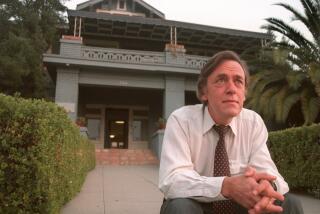California and the West : Attorney Stanley Fleishman Dies : Law: First Amendment champion defended writers, the disabled and pornographers.
- Share via
Stanley Fleishman, an attorney physically disabled by polio from the age of 1, overcame handicaps to stand in front of the U.S. Supreme Court on crutches and win countless 1st Amendment and civil rights suits for clients ranging from the handicapped to pornographers.
Fleishman died Thursday at Cedars-Sinai Medical Center of pneumonia and complications from surgery to remove a benign tumor. His daughter Bette said he died in his sleep. Fleishman was 79.
Barry Fisher, who worked with Fleishman for 25 years in their public interest law firm Fleishman & Fisher, said Fleishman had argued a case before the U.S. 9th Circuit Court of Appeals two months ago despite deteriorating health. It “was his first from a wheelchair,” Fisher said. “He still won.”
Fleishman was known for winning, and he was revered by his colleagues even if some of his clients were not. He did extensive work on behalf of the disabled, but Fleishman also earned a reputation for defending far less savory clients as a pioneering member of the “porn bar” who defended the public’s right to create, buy and sell products related to sex.
He broke legal ground for the 1st Amendment, championing such wide-ranging fare as the adult film “Deep Throat,” Henry Miller’s once-banned book “Tropic of Cancer” and the chain of Pussycat Theaters.
That work earned him the Hugh M. Hefner 1st Amendment Award for lifetime achievement “for his persistent devotion and unflagging courage in extending the 1st Amendment, by means of the judicial process, to include hitherto unprotected modes of expression.”
Fleishman was invited to--and attended--such meetings as the World Pornography Conference as well as the California Assn. of the Physically Handicapped and Paralyzed Veterans of America, who also gave him awards.
The Independent Living Center of Southern California, in granting Fleishman its lifetime achievement award, noted: “Your efforts to ‘move’ forward and protect the civil rights of persons with disabilities by ‘shaking’ the system with your expertise and love for the people has made you an exemplary role model.”
Fleishman waged legal battles to put the disabled on juries, on buses and airplanes, in schools and in public buildings like the Postal Service and private ones, including hotels and restaurants.
But he never saw himself as disabled. He was known for holding open a courthouse door with his crutch for somebody else while carrying his own briefcase.
Once identifying himself for a California Law Business writer as the “dean of it all, my dear,” Fleishman came a long way from his birth in New York City to a Russian immigrant printer. Stricken by polio as a baby, he was left with unresponsive legs and a virtually useless left arm, and a lifetime of braces and crutches.
After studies at the University of Georgia, Brooklyn College and the Columbia School of Law, Fleishman worked for a Wall Street law firm and then, looking for warmer climes, moved to Los Angeles in 1946. Shortly after his marriage to the hospital dietitian he met when a car accident broke one of his weak legs and landed him in the hospital, Fleishman fell into his first obscenity case.
A former roommate’s cousin complained of a problem with the Postal Service, which had blocked delivery of a film he was marketing by mail. Fleishman, who described the product as “a plain old 8-millimeter film of a nude woman walking down a flight of steps--and I’m sure she wasn’t even totally nude,” argued due process. He contended that the Postal Service could not take administrative action without a fair hearing. He prolonged the case until the client sold some films--and told everybody Fleishman knew how to beat the Postal Service. Fleishman suddenly had a specialty--defending pornography.
Breaking new ground did not come without peril.
“We used to get a lot of death threats at home,” Fleishman said in 1991. “When it first started in the mid-’50s and early ‘60s . . . my kids heard regularly in school that their father was a dirty old man.”
One of the nearly two dozen of his cases that reached the U.S. Supreme Court (half ended in his victory before argument) involved the book “Sex Life of a Cop.” A Grand Rapids, Mich., jury had convicted a California bookseller of obscenity for mailing the book there and sentenced him to 25 years of hard labor. An Oakland grand jury also weighed indicting Fleishman for advising a local bookseller that the book did not violate obscenity laws. The Supreme Court overturned the criminal conviction, and Fleishman never got indicted.
Once asked by Los Angeles Lawyer magazine if he found it easier to advocate a quality book like “Tropic of Cancer” (for which he won a California Supreme Court ruling that the book was not obscene) than something like “Sex Life of a Cop,” Fleishman said:
“Sure, on a visceral level, it’s more satisfying. It’s more socially acceptable to deal with Henry Miller--he was a celebrity, an interesting man, and my friends paid more attention. Henry Miller’s work is more enjoyable, more challenging as literature, but I used to get very angry with some literary figures whom I asked to testify as expert witnesses when they said: ‘I’ll testify for Henry Miller but not for this crap.’ . . . My whole argument has always been that whether it’s good or bad, whether you like it or not, is irrelevant under the 1st Amendment.
“Either you have freedom or you don’t have freedom,” he said. “You can’t start having an exception for this or that form of expression.”
Perhaps surprisingly, it was his background in obscenity cases rather than his physical disability that led Fleishman into advocacy for the handicapped.
Not long after Congress had passed the Rehabilitation Act of 1973, he was preparing for trial on the film “Deep Throat” when he realized people in wheelchairs were being excluded from juries for not being “in possession of their faculties.”
Working with a class action lawsuit, which became another tool in his arsenal, Fleishman got juries to accept people in wheelchairs. Then he got juries to admit the blind and deaf as well. He continued with lawsuits to win access to jobs, airlines and training for other physically disabled people--even access to the Rose Bowl press box for a disabled broadcaster.
Fleishman joined the board of the Western Law Center for the Handicapped, lobbied the Beverly Hills Bar Assn. to form a committee on the rights of the handicapped, and launched the litigation-minded Institute for the Disabled and the Elderly at Southwestern Law School, where he taught constitutional law.
Modest about his accomplishments on behalf of the nation’s estimated 35 million handicapped, Fleishman once told California Lawyer magazine: “It’s a way to do God’s work and get paid for it.”
Fleishman is survived by his wife of more than 50 years, Doris, and three daughters, Bette, Sue and Judy.
Public funeral services will be at 12:30 p.m. Sunday at Leo Baeck Temple, 1300 N. Sepulveda Blvd., in Brentwood. The family has asked that donations be made to the American Civil Liberties Union.
More to Read
Sign up for Essential California
The most important California stories and recommendations in your inbox every morning.
You may occasionally receive promotional content from the Los Angeles Times.













